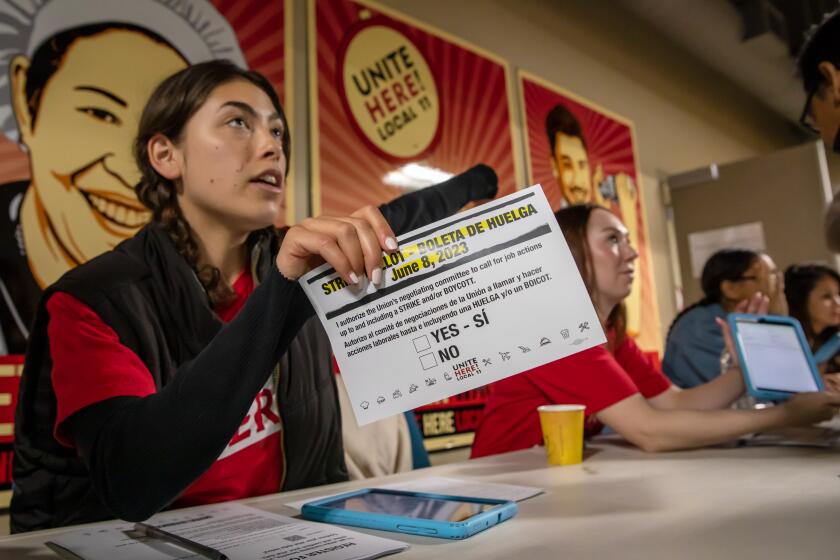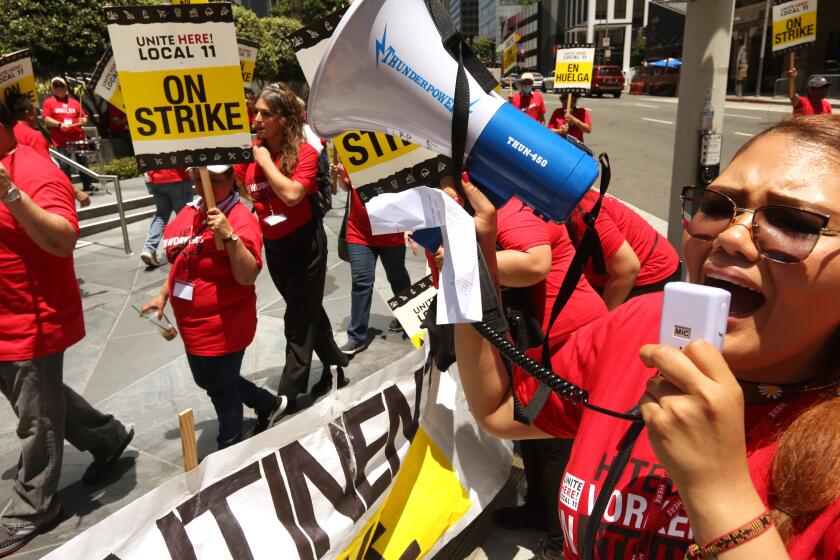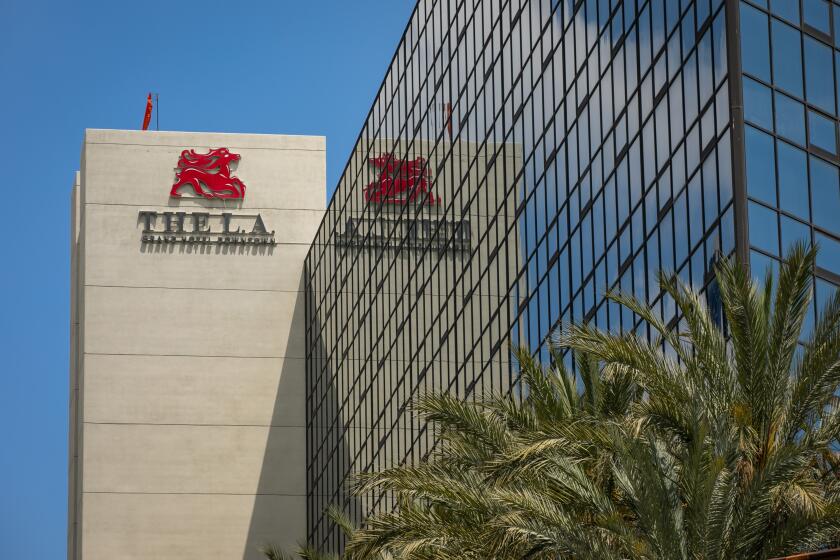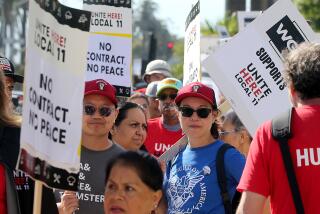No sign of progress in L.A. hotel strike ahead of Fourth of July holiday
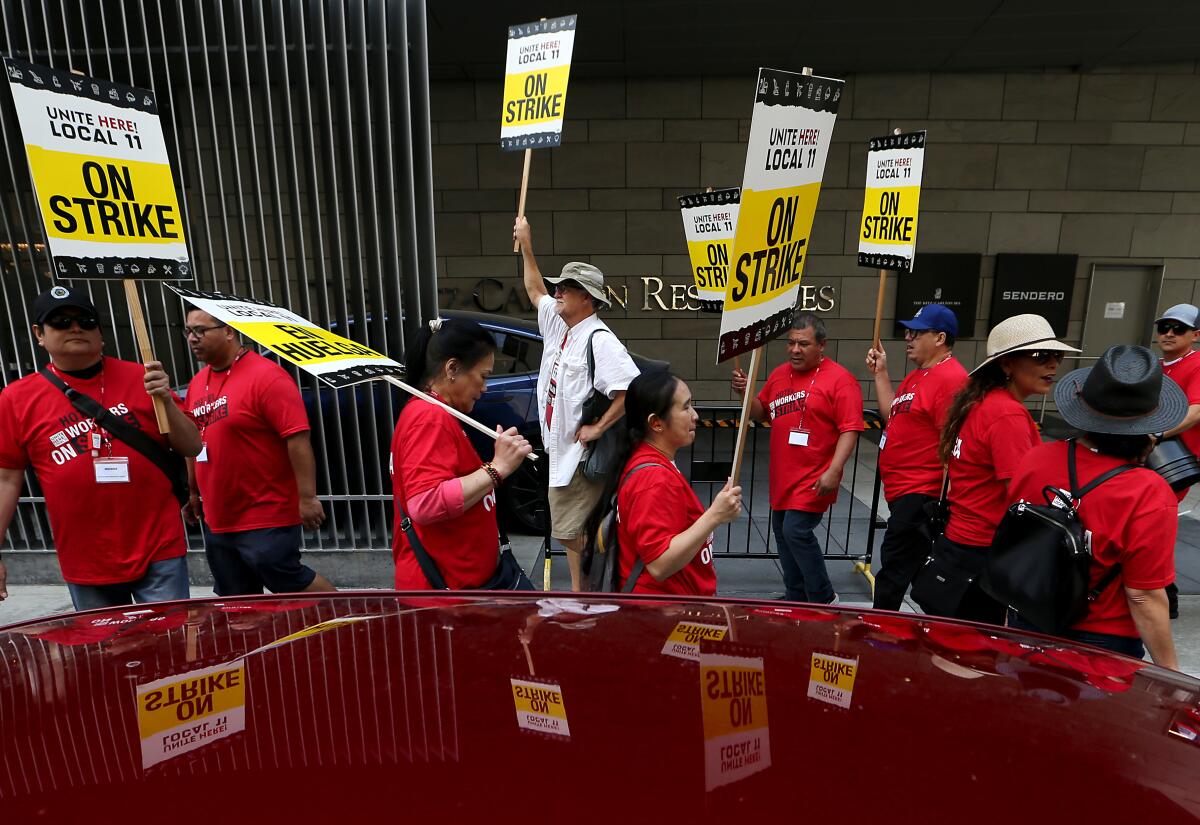
On the second day of a major strike, thousands of service workers at hotels in Los Angeles and Orange counties remained off the job Monday in the middle of the tourist-rich Fourth of July holiday period, with no sign of movement toward contract agreements or clear indication of which union-represented hotels will see picket lines next.
Contracts expired at midnight Friday for about 60 Southern California hotels where workers are represented by Unite Here Local 11, and the strike began Sunday morning. The Westin Bonaventure Hotel & Suites in downtown L.A., the union’s biggest employer with more than 600 workers, reached a tentative deal Wednesday evening, averting a potential strike ahead of the contract expiration at that location.
But none of the other hotels in Los Angeles and Orange counties have reached agreements with the union yet, according to Kurt Petersen, co-president of Unite Here Local 11.
By Monday afternoon, employees at 18 of those hotels — including the Biltmore and JW Marriott in downtown Los Angeles and the Fairmont Miramar in Santa Monica — had gone on strike, according to the union. Workers remained on the job at a number of other Local 11-represented hotels.
Hotel workers in Los Angeles and Orange counties voted to authorize a strike during the height of tourism season if talks don’t result in a new contract.
The union hasn’t said which hotels will see walkouts and pickets next.
“It’s a strategic decision about where we are going to strike next, and many factors go into it,” Petersen said Monday. The fact that downtown and Santa Monica hotels were particularly busy with the Fourth of July holiday and a large anime convention downtown played into the union’s decision to strike at several of those properties first, he said.
“We want to keep the hotels on their toes and guessing. Every hotel has agency strikebreakers in their properties, waiting to be deployed,” Petersen said. “When people are working and not striking, they’re paying two workforces inside the hotel.”
Peter Hillan, a spokesperson for the Hotel Assn. of Los Angeles, said it is typical for hotels to hire temporary workers to ensure guests are served when union workers are striking. “If workers are complaining about being replaced, they should show up to work,” Hillan said.
Business continued as usual Monday afternoon at the JW Marriott in the L.A. Live entertainment district, even as picketing hotel workers lined the sides of the street playing drums and kazoos.
Standing by the picket line, banquet worker John Steen said he felt “really confident” about the strike, saying the number of pickets had increased substantially from Sunday.
Steen said he works at both the InterContinental and the JW Marriott to make ends meet because he is not guaranteed 40 hours a week at either location.
“Most banquet servers or bartenders have a second or third job in order to be able to survive,” Steen said.
The union has not budged from its position in April, when it proposed a $5 immediate hourly wage increase and a $3 boost annually for three years. The pay raises are necessary, the union says, because of the region’s expensive housing, which is forcing workers to move farther away.
With hotels packed for the holiday weekend and the Anime Expo in full swing, a massive strike gets underway in Los Angeles and Orange counties.
Likewise, a coalition of more than 40 of the hotels involved in negotiations with the union has not softened its stance since the contracts expired Friday, arguing that the union was focused on a political agenda instead of the interests of employees. The group has also accused the union of failing to negotiate in good faith.
Complaints about the high cost of living have been a common theme in labor actions this year, including the Hollywood writers strike, which began May 2, and in tense negotiations between actors represented by SAG-AFTRA and studios. Similar complaints were also the basis for a historic strike in the fall of some 48,000 unionized academic workers across the University of California’s 10 campuses.
The hotel bargaining group argues the union should seriously consider its proposal of raises of $2.50 an hour in the first 12 months and $6.25 over four years. Under the proposal, according to the hotel group, housekeepers at unionized hotels in Beverly Hills and downtown Los Angeles, currently earning $25 per hour, would receive 10% wage increases in 2024 and would make more than $31 per hour by January 2027.
The coalition was formed in May, as the union ramped up pressure on dozens of hotels with expiring contracts to approve sweeping wage increase proposals.
Keith Grossman, an attorney with Hirschfeld Kraemer, one of two law firms representing the hotel coalition, said in an emailed statement Monday that the union canceled a scheduled bargaining session with the coalition June 28 and refused to meet June 29 and 30, before the contract expired. The union denies that it canceled a bargaining session.
“The group has told the union it is available to meet anytime, and the union has declined to do so,” Grossman said. “It is the union that is focusing on taking employees out of work rather than meeting to negotiate a settlement.”
The situation at the L.A. Grand, a downtown hotel that provides homeless housing through a contract with the city, has been particularly fraught. The 13-story hotel has been crucial to the mayor’s Inside Safe initiative, which seeks to dismantle homeless encampments and bring people indoors.
A strike by hotel workers would disrupt operations at the L.A. Grand, which has provided rooms for homeless Angelenos since the outbreak of COVID-19.
Unite Here Local 11 represents the cooks, dishwashers and housekeepers who clean rooms and provide three meals a day to the hotel’s unhoused clients. Those workers — who are employed by the hotel, not the city — walked off the job Monday.
Russ Cox, a representative for Shenzhen New World I, the Chinese company that owns the L.A. Grand, said Monday that meal service at the hotel had continued as scheduled, with the purchase of some pre-prepared food items and replacement workers in the kitchen. The hotel is also “in the process of lining up some replacement workers to take care of the housekeeping work,” Cox said.
More to Read
Sign up for Essential California
The most important California stories and recommendations in your inbox every morning.
You may occasionally receive promotional content from the Los Angeles Times.
